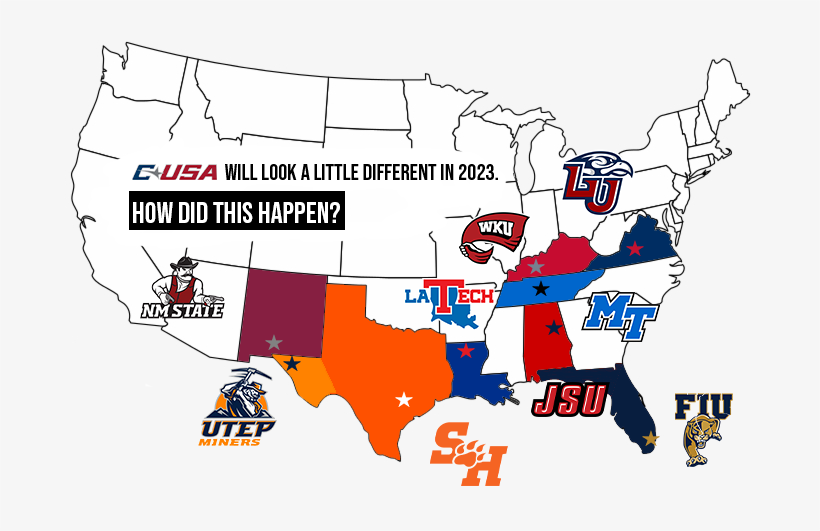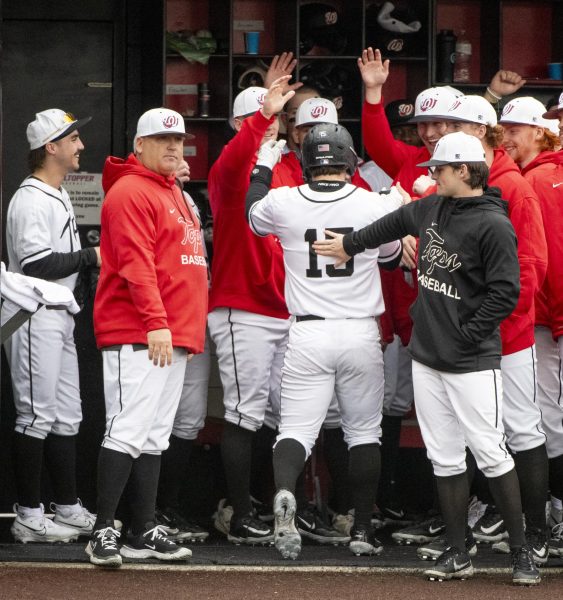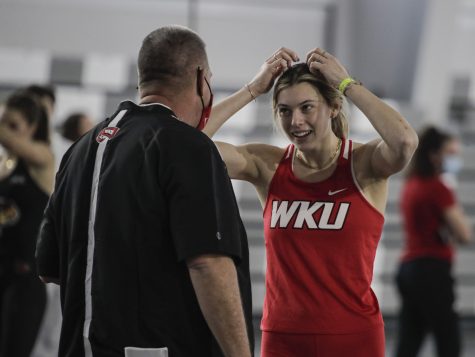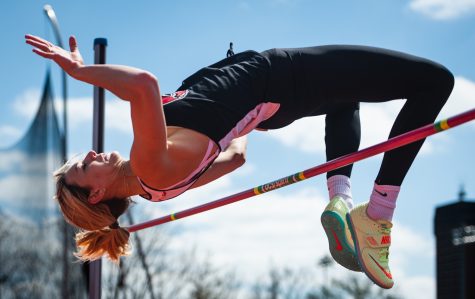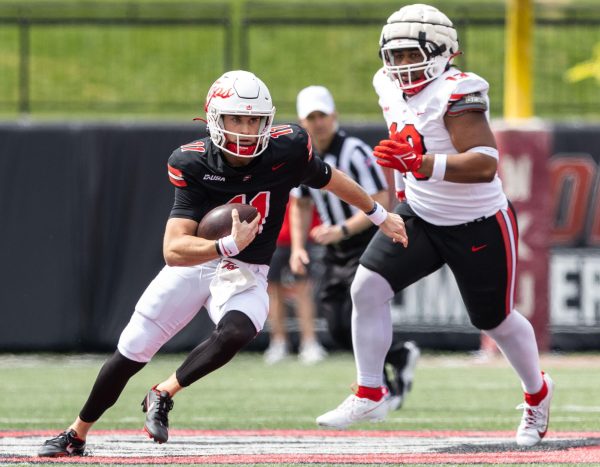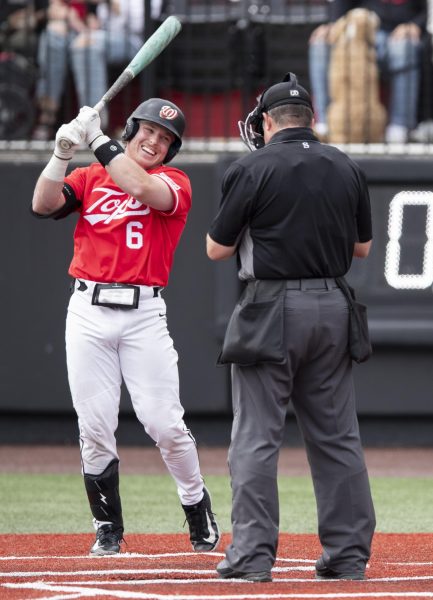‘One chapter in a long book’: WKU AD Stewart illustrates program’s role in conference realignment, future of C-USA
Conference USA will shrink from 14 members down to nine in 2023, taking the above shape.
November 23, 2021
Conference realignment spares no one. 2021’s realignment saga touched every corner of the college sports world, including up on the Hill.
WKU has called Conference USA home since 2014. At the start of the 2021-22 academic year, its membership numbered 14 programs. This would change when the domino effect of realignment kicked into overdrive.
A crash course in conference realignment
Texas and Oklahoma accepted invitations to join the SEC on July 30. This left a vacancy in the Big 12 Conference, and the question of which programs would fill the gap was on the brain of every athletic department in the nation.
Things remained relatively quiet throughout August, but the American Athletic Conference lost three members, Cincinnati, Houston and Central Florida, to the Big 12 on Sept. 10. This meant that the AAC might look in C-USA’s direction to build its roster back up.
Six C-USA schools were picked to move to the AAC on Oct. 19 – but WKU was not among them. Soon after, C-USA lost three more of its members to the Sun Belt Conference, and WKU sat untouched.
Word started to circulate in early November that the Mid-American Conference presidents would meet to discuss taking on WKU and rival MTSU as new members.
This sparked hope for many WKU fans. This could be the Hilltoppers’ chance to extract themselves from C-USA once and for all. What followed was a week of stressful waiting, watching and speculating – there seemed to be no clear indication which way the move would go, but it was clear many fans did not want to stick around in C-USA.
How did WKU end up in C-USA?
Chad Bishop, a former reporter for the Bowling Green Daily News who covered WKU Athletics when the Hilltoppers first joined the league, explained some of the decision making that led the Hilltoppers to leave the Sun Belt Conference and join C-USA in the first place.
“I think the thinking was, great, we’re in a league now that maybe values basketball a bit more, maybe there’ll be a lot better TV revenue, maybe there’ll be some better rivalries with Middle Tennessee and UAB and Old Dominion and Marshall,” Bishop said. “There was definitely a lot of excitement at the time of the move.”
“Definitely on the front end it was like, ‘yay, Conference USA is going to be better than the Sun Belt’,” Bishop continued. “I think over time, a lot of factors, TV revenue maybe not being as large as [first] thought, a lot of the travel costs and basketball kind of remaining a one-bid league, I think all that combined probably made people realize that maybe Conference USA wasn’t all it’s cracked up to be.”
The program’s move to C-USA so many years ago was viewed favorably at the time. The Hilltoppers left the Sun Belt behind in hopes for greener pastures, but the conference experienced massive growth in the years since as C-USA stagnated.
“I was named the athletic director in 2012, and right after that I went around and listened to people, and virtually everybody I would run into at the time said, ‘you need to get us into a better conference, you need to get us out of the Sun Belt Conference’,” WKU athletic director Todd Stewart said. “It was a widespread feeling that we needed to get out, and that was back in 2012… the Sun Belt that we left is very different from the Sun Belt of today, and they deserve a lot of credit for that.”
There will be no MACtion
C-USA remained active throughout all of this, bringing four programs into the fold in Liberty, New Mexico State, Sam Houston State and Jacksonville State. But still no word came about WKU and MTSU’s positions. The trend was that the MAC was interested in both schools as a package deal, but would not accept one or the other by itself.
Ultimately, MTSU committed itself to C-USA and the MAC announced it was not interested in expanding. This left WKU in a new-look Conference USA, a group that will number just nine members in 2023. The end result was met with disappointment and frustration from WKU fans.
Many among the Hilltopper faithful questioned why the school didn’t make an attempt to return to the Sun Belt. Some believed WKU’s exit may have permanently closed the door to the SBC, but this wasn’t the case.
“We did have conversations with the Sun Belt Conference,” Stewart said. “I know a lot of people think that, because we left the Sun Belt, that door is always closed. That’s not what we were told, what we were told was that they were pursuing more of an East Coast strategy, taking two schools from Virginia and then adding Marshall, kind of expanding their footprint up the East Coast. That was their strategy this time around, obviously that didn’t include us.”
Caboni’s influence
WKU president Timothy Caboni played a larger role in the proceedings than many may think. Caboni became executive vice chair of the conference’s board of directors over the summer and North Texas president Neal Smatresk was appointed as the chair. When Smatresk’s school announced its intent to leave for the AAC, Caboni assumed the vacant position.
“At that point you’re talking about the night of October 18, all of a sudden being told, ‘okay, you’re the chair and we just lost six members of our conference’,” Stewart said. “It’s like the baseball equivalent of a pitcher coming into a game with the bases loaded, nobody out, three balls and no strikes and the manager hands the pitcher the ball saying, ‘okay, get us out of the game’.”
Caboni immediately jumped into the recruiting process, contacting other institutions in search of programs that had interest in joining C-USA.
“To his credit, he jumped right into it and was heavily involved in really all [of] the discussions,” Stewart said. “[He] went and did campus visits to James Madison and Liberty with some other people from the conference and certainly was on multiple daily zoom calls with people who were interested in coming into the conference.”
In Stewart’s view, the president’s quick action was key to establishing the current shape of the league.
“I really do feel like, had he not taken the leadership role that he took, that it would not have turned out as good as it did. It would have turned out worse for the conference were it not for his involvement,” Stewart said.
The immediate future
C-USA still lacks a cohesive brand, something Stewart understands. With a new crop of teams joining up in 2023, the league will need an aggressive branding push to re-establish its name, a project that is already in the works.
“There’s already been some talk of that, with four of the nine members being new, almost half the league is new,” Stewart said. “And if we were to add another one, I don’t know if we will or not, but if we were then 50% of the league would be new. So I do think that you’ll see an aggressive branding campaign, the weird thing is we still have this year and another year, you can’t put the cart too far in front of the horse. But the plans for that have already started and I think you will certainly see that as we get closer to these teams actually competing against each other.”
Nine departing members means the conference will be receiving a large sum of money in the form of exit fees. The program does not know how big of a slice it will receive at this time as some will need to be put towards the conference’s needs.
“We don’t know yet, we’ll get something for sure,” Stewart said. “The way it works is, the nine that leave, they don’t leave all the revenue behind but some of their revenue this year and next year behind. That is divided up among the schools that remain, but also some of it goes to the conference office. Ultimately the executive committee of the league will decide how that’s allocated. I think that some will go to the conference office, some probably will go into reserves, some will go to pay for the branding campaign, we’ll have to totally re-market ourselves as a league.”
Stewart and his department already have three major capital projects in mind for when WKU does receive its share of the exit fees.
“There’s a number of things that we need to do, there’s a number of things we actually have already done over the last five or six years so it’s not like this just started,” Stewart said. “I would say the three things that need to happen over the next few years, in no particular order – we need an indoor facility, that’s really the one thing that we don’t have. Having an indoor facility would be great for all of our programs, but I think also for the campus. We would incorporate intramural sports in that as well so students would be able to use that also, it wouldn’t just be athletics.”
Houchens-Smith Stadium is also due for a facelift. The home of the Hilltoppers received its last round of major renovations in 2008, but the press box has remained largely as-is since the facility first opened in 1968.
“We need a new press box for football,” Stewart said. “This football program has come a long way, we’ve been bowl-eligible now 10 of the last 11 years, but that’s a 1968 press box. We’ve painted it and put carpet on it, we’ve done some things to improve it but still, in 2021, having to go up through the stands to [get] to a press box, we need to get away from that.”
Another major goal is to provide on-site locker room facilities for the soccer and softball complexes on the edge of campus. Athletes from both programs have to dress off-site before attending games, something Stewart hopes to fix moving forward.
“Those programs deserve that, they’ve had success,” Stewart said. “I think it will make them be able to operate much more efficiently.”
The NCAA at large
WKU has established a winning culture during its tenure in C-USA, winning a league-leading 32 conference championships since joining up in 2014. Stewart stresses that winning championships matter, but in today’s world, market size and brand recognition call the shots.
“Winning championships matters, it matters the most to the players and the coaches,” Stewart said. “That’s why they do it. And beyond that, it matters to fans and to alumni for the overall brand of the university. But it has not been the singular driving force in conference realignment, and certainly we wish it was.”
Stewart brings up the University of Texas to illustrate how market size and name recognition rule these kinds of discussions. The Longhorns are the sixth-most winningest football program in the Big 12 Conference since 2010. Stewart believes that If it were a blind resume, there’s no way the SEC would accept a program of that caliber.
“They probably wouldn’t even take the phone call,” Stewart said. “But because it’s Texas, obviously they’re in the SEC.”
Dr. Karen Weaver, an adjunct assistant professor at Penn University who researches topics that affect mid-majors and FBS Division I institutions such as governance, athletes’ rights and finances, feels that WKU’s place in the grand scheme of conference realignment is ultimately insignificant.
In Weaver’s view, major structural changes, driven primarily by FBS football, will render the current NCAA conference structure obsolete when the larger, money-making programs take advantage of their status and construct their own league.
“There’s about 128 schools that play FBS football, and I think it’s going to come down to 64 teams that are going to be in that power-elite group of football programs – and what happens to the other 64 is being determined right now,” Weaver said. “And that’s exactly where Western Kentucky is, they’re in that other 64 that’s scrambling for relevance and finances. It’s important to ask these questions, because it’s not like if you just make a move to another conference, it’s going to solve every problem because I think all of the money in the future is going to those top 64 teams.”
It’s hard to not picture this possible future while watching Texas and Oklahoma move to the SEC, giving the conference the appearance of a collegiate Death Star. Until then, remaining in the top level of NCAA competition gives the Hilltoppers enough opportunities to justify their FBS status.
“It’s still much better for us to be where we are now,” Stewart said. “We still have a seat at the table. We still are a part of the same NCAA Tournament as everybody else is… playing at this level still gives us a seat at the biggest table in the room. We’re in the same bowl system as everybody else, if that were to change at some point in the future, if we didn’t have the same access to NCAA tournaments, the same access to bowl games, that would probably cause some re-thinking.”
Patience is a virtue
Stewart understands many WKU fans are not satisfied with the program’s conference position, but right now, the program can only focus on what it can control – continuing to win championships.
“What we need to do, and what we’ve talked about internally a lot with our staff and our coaches is just control what we can control,” Stewart said. “That’s every single day, try to be a better version of ourselves than we were the previous day. If we keep doing that, and we keep being a better version of ourselves each day, keep winning, add some of these facility components to it… we’ll find ourselves in an even better position two or three years from now.”
Conference realignment isn’t the end-all be-all for any NCAA program. Stewart understands that while some fans may not be happy with the result of this year’s wave of reshuffling, this is just one part of WKU Athletics’ history.
“In anything in life, when something doesn’t happen the way you want it to, don’t rush to judgement,” Stewart said. “Take a big picture look. This latest episode of conference realignment was one chapter in a long book. While that chapter did not end the way we wanted it to, there’s a lot more reading ahead. There’ll be a lot more chapters in the book that, in my opinion, will be much more favorable than this one.”
Stewart has been very candid with his feelings towards the conference realignment outcome. The frustration from WKU’s fanbase is understood, and those feelings are heard. In the meantime, Stewart’s message to the Hilltopper faithful is one of patience.
“I’ve been very honest about it, we were very interested in the Mid-American Conference, and I think it would have been a very good fit,” Stewart said. “…There’s a lot of things we don’t have control over, and I think we don’t live in a patient world today. But sometimes patience is the best virtue. In sports, this is when we really need fans to support us. It’s easy to support a team when you’re winning championships and you’re in a great league and everything is going great, but when things maybe aren’t going great every year, that’s when you really need fans.”
“If they stick with us, we’ll keep winning championships, that I can guarantee,” Stewart said. “And we’ll keep working to improve our overall situation.”
Sports Editor Jake Moore can be reached at [email protected]. Follow him on Twitter @Charles_JMoore.

